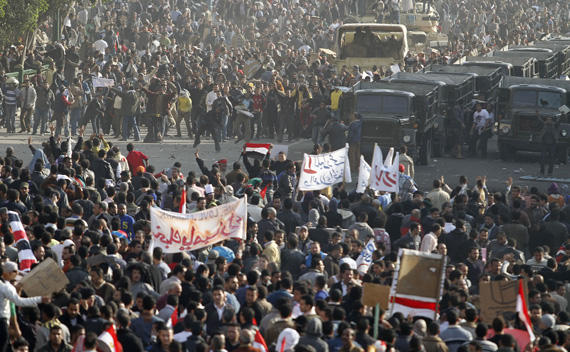China’s Views of the Unrest in the Middle East
More on:

As the unrest in the Middle East gets more intense, many Egyptians and people in other Arab nations appear to be looking to the response of the United States to the rising tension and violence in the region. That’s understandable, given the outsized role that Washington historically has played in this region, and the fact that Egypt is currently the second-largest recipient of U.S. aid, after Israel.
But how, if at all, will China react to instability and to potentially momentous change in the Middle East? Over the past decade, China has built far closer ties to many of the leading Middle Eastern states, largely to feed China’s growing energy appetites but also in the long run to fulfill Beijing’s rising geopolitical ambitions. Besides its increasingly close ties with Saudi Arabia, Sudan, Turkey, and Iran, Beijing has also built closer strategic and trade ties with Egypt, among other pivotal Middle Eastern nations. Beijing also has begun to slowly insert itself into the politics of the region, whether by appointing its own special envoy to Sudan or contributing to anti-piracy patrols in the waters between Yemen and Somalia. On a recent visit to Turkey, China signed a plan to create a “silk railroad” following the rough path of the ancient Silk Road.
China’s leadership fears and despises instability above all, both at home and within nations it needs as partners. Still, as the appointment of a special envoy to Sudan showed, Beijing is capable of playing - or appearing to play – a larger diplomatic role farther from its borders. Yet, so far, Beijing has remained very quiet about the unrest in Egypt, and appears to have censored reporting on Egypt inside China. Beijing seems to be blocking the word Egypt from blogs and microblogs inside China, and state press outlets also seem to be suggesting that unrest is simply the natural result of wanting more democracy.
Though Beijing does not yet seem ready to play any larger role in times of unrest in the Middle East – and China instinctively shies away from appearing to intervene during times of unrest in a country – Beijing can’t insulate itself from any repercussions forever. Two years ago, during the green movement protests in Tehran, demonstrators gathered to shout epithets against Beijing, because of China’s close trade relationship with Iran. Eventually, as China becomes more powerful, it risks such a backlash in other nations like Egypt – just as the United States now does. But China’s leaders, for all their growing confidence in global affairs, still seem at a loss when considering how to handle unrest in states important to China, whether that country is Burma, Kyrgyzstan – or Egypt.
More on:
 Online Store
Online Store
